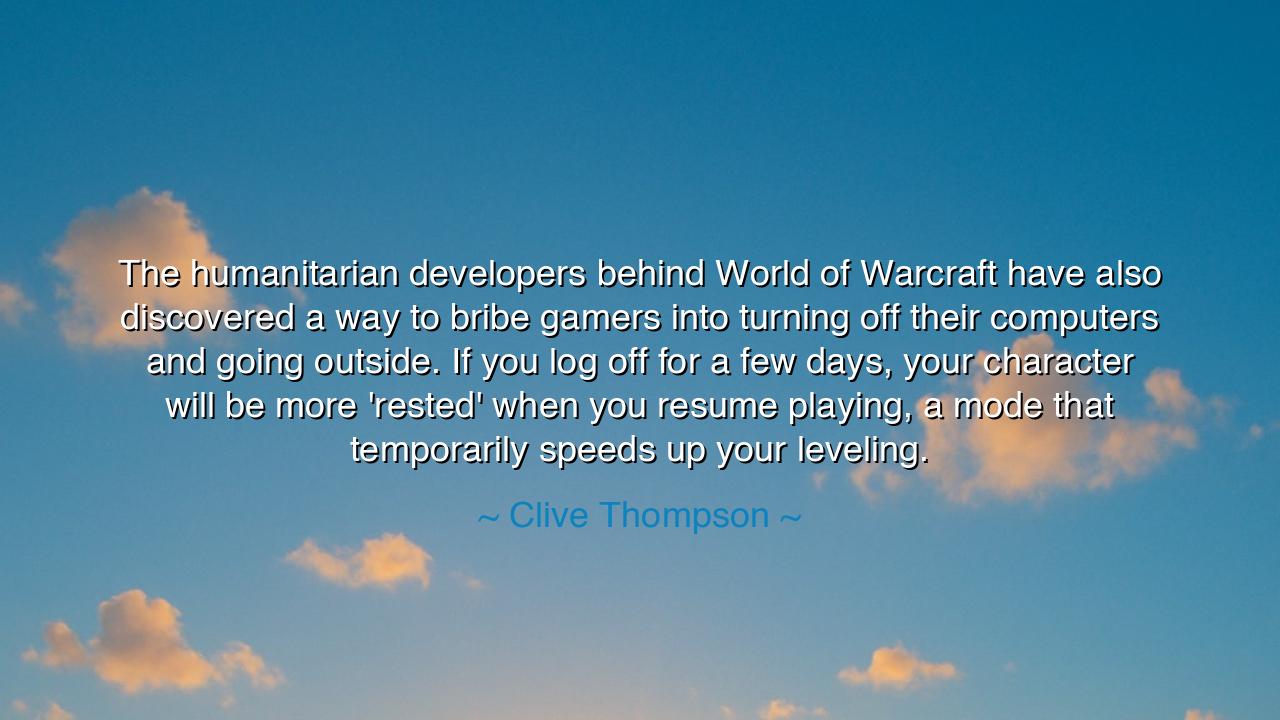
The humanitarian developers behind World of Warcraft have also
The humanitarian developers behind World of Warcraft have also discovered a way to bribe gamers into turning off their computers and going outside. If you log off for a few days, your character will be more 'rested' when you resume playing, a mode that temporarily speeds up your leveling.






There are times when truth reveals itself in the most unexpected of places — even in the realms of fantasy, where swords flash, dragons rise, and heroes quest endlessly for glory. In such a world, Clive Thompson — a sage of the digital age — once observed a subtle wisdom hidden beneath play. He wrote: “The humanitarian developers behind World of Warcraft have also discovered a way to bribe gamers into turning off their computers and going outside. If you log off for a few days, your character will be more 'rested' when you resume playing, a mode that temporarily speeds up your leveling.” Beneath his words, half in jest and half in revelation, lies an eternal principle: that rest is as vital to strength as effort, and that even in a world built of pixels and code, the human spirit cannot thrive without balance.
The meaning of this quote reaches far beyond the boundaries of gaming. Thompson is not merely speaking of World of Warcraft, but of the human tendency toward obsession — the endless drive to achieve, to advance, to grow, even when it costs us our peace. In this digital allegory, he finds a profound truth: that wisdom sometimes lies not in pushing forward, but in stepping away. The developers, whom he calls “humanitarian,” understood something timeless — that exhaustion dulls not only the body but the imagination. To “log off,” in their design, is not a punishment but a gift; the act of withdrawal becomes a source of renewal. Like ancient philosophers who urged contemplation between battles, they remind the modern soul that one must rest to rise again stronger.
The origin of this reflection comes from Thompson’s work as a writer exploring the intersection of technology, psychology, and human behavior. Observing how games shape minds and habits, he saw in this design choice an unexpected act of benevolence. The creators of World of Warcraft, aware of the game’s seductive power, built into its mechanics a subtle safeguard — the “rested experience,” a feature that rewards the player not for relentless grinding, but for taking time away. In this, Thompson glimpsed an ancient paradox renewed: that progress comes fastest when one learns to pause. It is as if the game itself whispers the forgotten truth of the sages — that strength without stillness leads to ruin.
History, too, echoes this wisdom. Consider the tale of Alexander the Great, conqueror of empires, whose armies marched tirelessly from Greece to the edge of India. Yet it was not in battle that Alexander’s greatness endured, but in the moments between — when he stopped to build cities, to learn from scholars, to contemplate his vision of unity. His soldiers, weary from endless conquest, found that without rest, even the mightiest purpose fades into madness. And so, like the gamers of Thompson’s parable, they learned that even in victory, one must sometimes lay down the sword, lest it grow too heavy to lift again.
The message is not limited to generals or gamers; it speaks to all who live in an age of ceaseless motion. The world now worships the idol of productivity, urging men and women to move faster, achieve more, and never stop. But the developers of Warcraft, in their quiet cunning, offered a mirror to our times. They taught through design what philosophers once taught through parable: that rest is sacred. In stepping away, we reclaim perspective. In silence, we rediscover meaning. In stillness, we regain our strength to act.
Even nature itself bears witness to this law. The earth turns in cycles of growth and dormancy, the seasons breathe in and out, and even the heart, though ceaseless, beats in rhythm — contraction, expansion, pause. So too must the soul find its rhythm. When we “log off” — from our labor, from our screens, from the endless pursuit of more — we do not lose progress; we prepare for it. The mind, once weary, becomes fertile again. The spirit, once strained, rediscovers wonder.
Thus, the lesson of Thompson’s words is clear: the wise do not chase endlessly; they know when to stop, to breathe, to renew. The modern warrior, whether coder, artist, or dreamer, must remember that mastery lies not only in doing, but in being. To rest is not to abandon the quest, but to honor it. Step away from your machines, your work, your striving — and you will return stronger, clearer, more alive.
And so, my listener, take heed of this quiet teaching from a world of make-believe that reveals a truth more real than steel: that rest is a form of wisdom, and that the soul, like the hero, needs its sanctuary. Log off, walk outside, breathe the air that no program can simulate. For when you return — to your work, your art, your life — you will find yourself “rested,” and the world, like the game, will open before you once more, rich with possibility.






AAdministratorAdministrator
Welcome, honored guests. Please leave a comment, we will respond soon